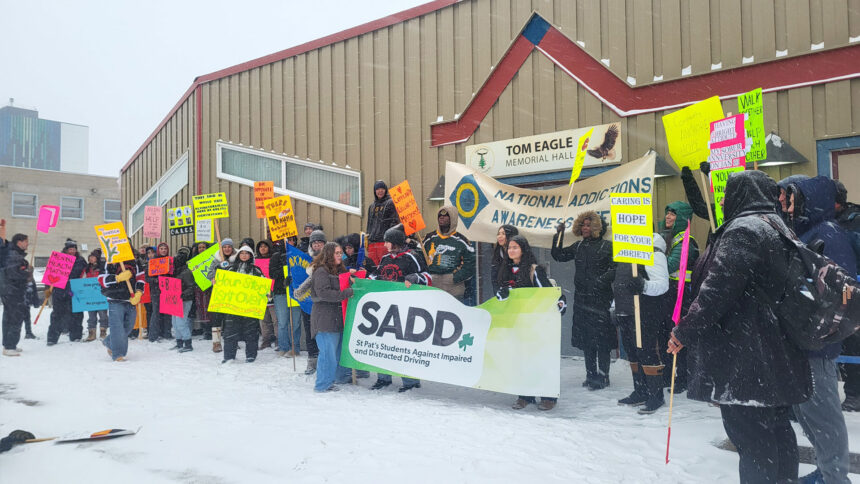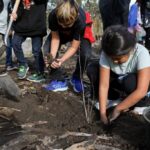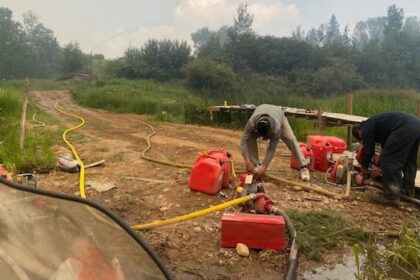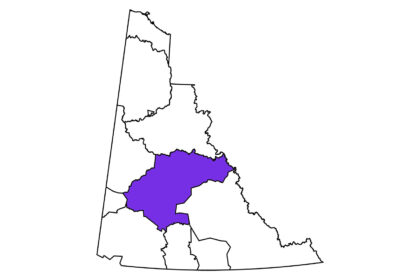The streets of downtown Yellowknife were filled with voices of hope and resilience this week as dozens of demonstrators gathered for a march to kick off National Addictions Awareness Week. The event, organized by the Tree of Peace Friendship Centre, featured posters bearing messages like “Community Matters,” “No More Stigma, No More Shame,” and “Your Story Is Not Over.” The march highlighted the ongoing struggle with addiction in the North and the power of community support. For participants like Olivia Willih, the event was deeply personal. Willih, a Tłı̨chǫ Dene woman originally from Whatì, is five and a half years sober. She marched to honour friends and family who are still struggling, carrying a sign displaying her length of sobriety as a beacon of hope for others. “That first step of reaching out, really wanting it, because you can say that you want to get sober, but to actually do it, it’s hard,” Willih said. “I’m hoping people who see me here will think, ‘If she can do it, I can do it.’” She credits her daughter as her primary motivation. “I think because of my daughter, it’s the reason I’m still sober. I’m a single parent and it’s hard, and I don’t want that life for her.” A pressing need in the North The march in Yellowknife to kick off National Addictions Awareness Week. Photo: Charlotte Morritt-Jacobs/APTN. The march comes against a backdrop of significant need in the Northwest Territories. According to the latest national statistics from 2023-2024, the rate of hospitalizations entirely caused by alcohol and the rate of police-reported drug offences in the N.W.T. was over four times the national average. While residents are sent south for inpatient programs free of charge, there has been no permanent inpatient treatment centre in the territory since 2013. A major challenge, however, is connecting people to the help that exists. The territorial 2024 Mental Wellness and Addiction Recovery Survey showed that only 61 per cent of respondents had heard of community counselling programs, and just 35 per cent were aware of other supports like facility-based addictions treatment. Sub: A focus on youth and community This year’s theme, “Anchoring Hope,” was a message clearly embraced by the younger generation at the march. “Addictions are a huge issue within the Indigenous community, so it is important to put our wellness first and heal our people,” said Richard Epelon, who marched with a sign featuring a medicine wheel. Emily Conde, a Grade 10 student at St. Patrick’s High School, shared a message for anyone battling addiction. “It’s important for you to be here; your life makes the world a better place,” she said. “This walk is about hope. It’s about moving forward and believing in yourself.” Christina Moore, an Indigenous Youth Worker with the Tree of Peace, emphasized the importance of connection, especially for youth. “Technology can really be isolating, so that connection piece and community piece is really important. Coming out for different cultural activities is really important,” Moore said. The week is filled with sessions specifically targeted for kids and youth. A long awaited wellness centre on the horizon Adjacent to the friendship centre, construction is underway on a new Wellness and Recovery Centre. The territorial government has shared designs for the facility, which will deliver programs currently offered through the Soaring Centre and Day Shelter. The centre will include 30 beds in the recovery centre, 59 seats in the day shelter, along with bathrooms, showers, laundry facilities, storage for clients’ belongings, a community hall for cultural events and space for counselling. Originally slated to open in 2023, the project is now expected to be completed by the end of 2026. The path forward Events are taking place throughout the week across the territory. The Tree of Peace Friendship Centre will also host a community roundtable to gather input on aftercare programs, discussing what is working and what gaps in services still exist. It’s a conversation Willih is happy to have. Drawing from her experience as a receptionist at the Tree of Peace, she sees specific needs. “We need a lot more of the on-the-land stuff, for sure. I think we need more aftercare programs as well,” Willih explained. “I hear people say, ‘What happens when I get back?’ They can go to meetings, but as a community, we should be doing more, especially for the outlying communities.” Continue Reading
Northerners in Yellowknife anchor Hope for Addictions Awareness Week

Leave a Comment










